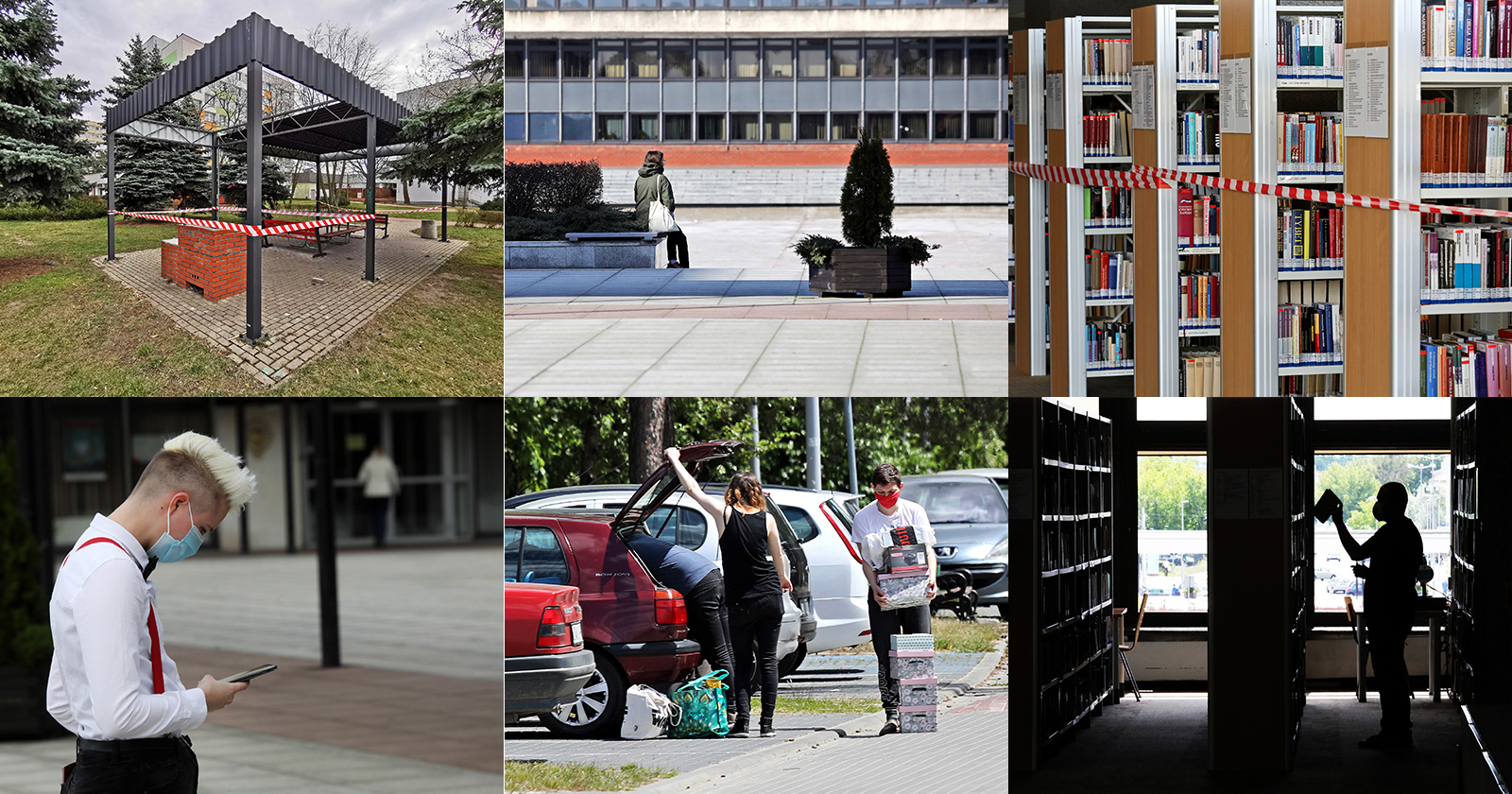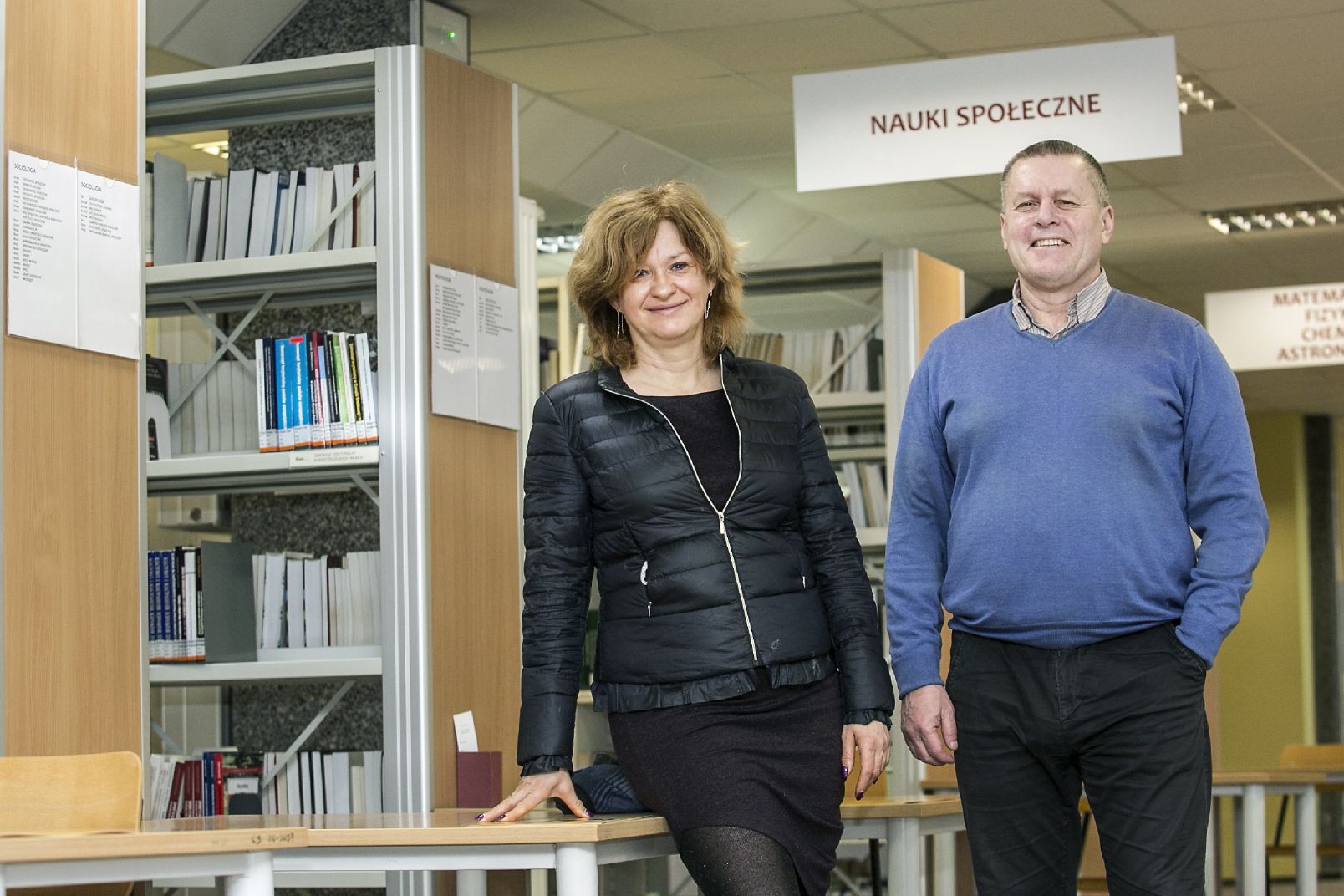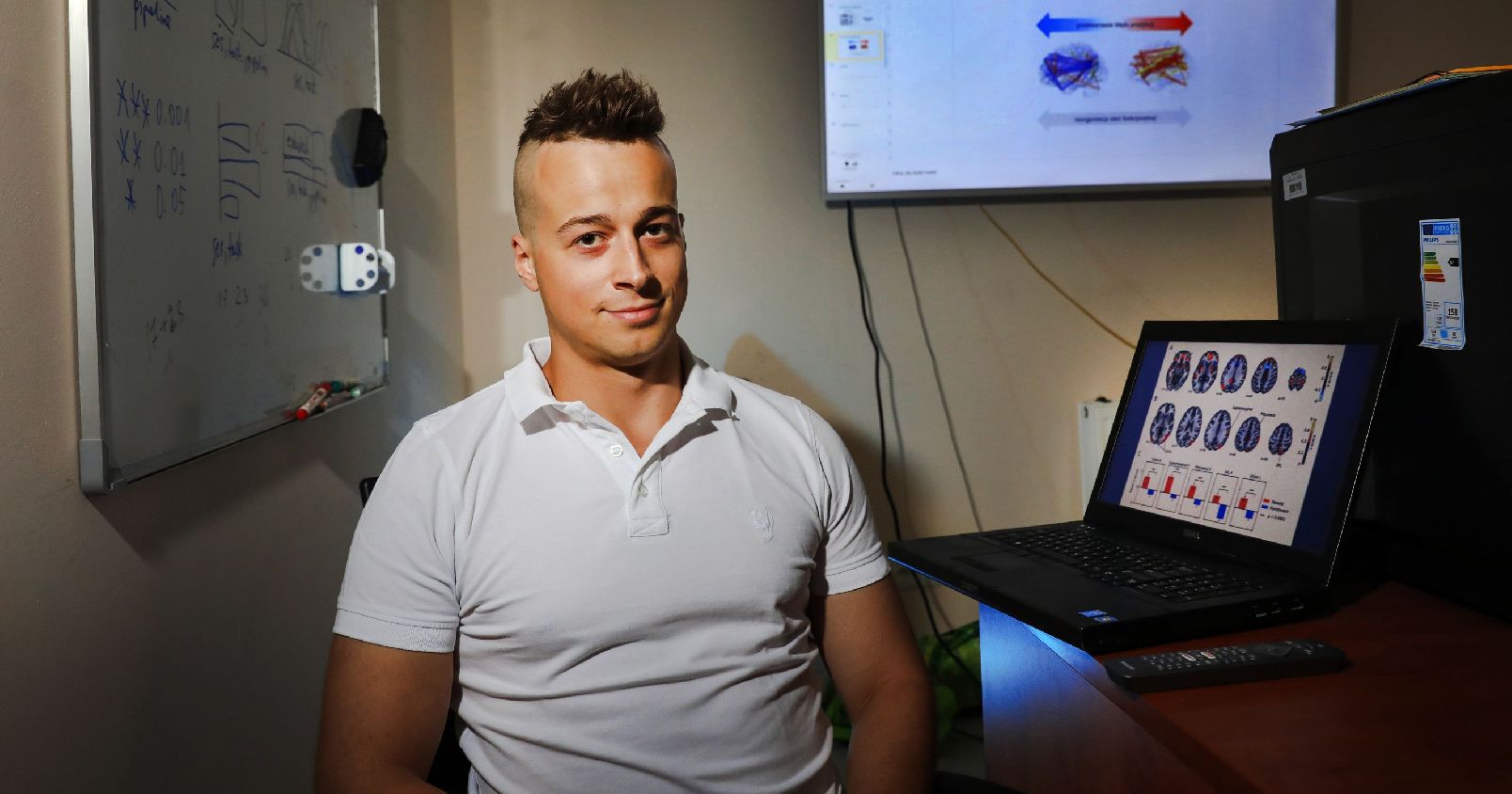iGen generation is looking for a safe haven
How did the iGen generation, for whom a sense of security is one of the most important values, react to the situation of threat related to the pandemic? - Today's 20-year-olds are on the verge of a mental crisis, which they do not realise - say Prof. Beata Przyborowska and Prof. Piotr Błajet, researchers from the Nicolaus Copernicus University, authors of a study on changes in students' health behaviour.
Our lives have been flowing to a different rhythm for almost a year now - there is no doubt that the Covid-19 pandemic has caused a dramatic change in our lives in all fields: professional, educational, relational, domestic.
Borderline situation
- Universities were among the first to completely change the rules of their operation and adapt to the new situation, - explains Prof. dr. habil. Beata Przyborowska from the Faculty of Philosophy and Social Sciences, Vice-Rector for Student Affairs at the Nicolaus Copernicus University. - We have moved almost entirely to distance learning for students, the organisation of research work has changed and, unfortunately, has been suspended in many cases. Furthermore, our daily household activities have not been spared either, as we face restrictions in meeting our various needs.
- It is an extreme situation. Borderline situation, as Karl Jaspers would say. In it we experience limitations, negative events and their consequences. But not only. - explains Prof. dr habil. Piotr Błajet from the Faculty of Philosophy and Social Sciences, director of the University Sports Center. - In a borderline situation we have the chance to discover and create ourselves, to tap into our hidden powers. After all, we are "back up against the wall", we cannot retreat, so we have to do something new. This situation can give enormous energy, which will be used to change behaviour. In a positive sense.

The researchers were interested in whether the pandemic affected, and if so to what extent, a significant change in the behaviour and health beliefs of the younger generation. They were interested in whether they would be dealing with transgressive activities, i.e., activities in which students would exceed their abilities and habits. In the first part of their research, Prof. Błajet and Prof. Przyborowska focused on health.
After all, it seems logical that a pandemic as a borderline situation, whose main narrative is a threat to health and life, could result in changes in health behaviour, explains Prof. Błajet.
- Awareness and perception of the health threat is strong in the public space. Inconsistent media releases and new reports, e.g., on negative consequences of the virus, all add to the dramatic effect - adds Prof. Przyborowska. - We wondered how students cope in this new situation.
Health = body+mind+relationships
Prof. Błajet and Prof. Przyborowska in their research used the WHO integral health concept and the Health Belief Model.
WHO defines health as a state of complete well-being: both physical, mental and relational.
- Health is not just the absence of an illness. Health formation involves neutralisation of possible threats and implementation of a positive programme, i.e., constant care for physical, mental and social, i.e., relational, well-being - explains Prof. Błajet. - Therefore, we focused on changes in these three areas. Additionally, we made a diagnosis of five central factors for changing intentions of a healthy behaviour.

This was a survey research. The authors' tool for measuring variables was used. The questionnaire was addressed to second-year full-time students - these students had mandatory physical education classes in their curriculum, which they had to take remotely due to the pandemic. The survey was conducted electronically in April and May 2020. (this was the time of both lockdown and loosening of restrictions). The researchers received 569 responses, the vast majority of which, 76.4 per cent, came from women.
- The practical aim of the research is no less important for us. We didn't just want to analyse what the situation is like, and describe new social phenomena, explains Prof. Przyborowska. - We wanted to gain knowledge about changes in health behaviours, which can be used, among other things, to develop health activity promotion programmes for students not only during, but also after the pandemic.
Threats do not induce changes
The research shows that the greatest behavioural changes concern physical and social well-being, with mental well-being coming out distinctly poorer against this background.
At a first glance, this is somewhat surprising. Students declared in the survey a sense of danger related to epidemics. Half of them believe that they may be vulnerable to it. They believe that taking health measures is worthwhile, considering the balance of benefits and costs, and they are motivated to take care of their health in the long term. It would seem that this should cause young people to seek help to cope with stress, to look after their mental wellbeing. However, this does not happen.
It turns out that the awareness of danger alone, recognition of the importance of pro-health activities and pro-health motivation are far from sufficient to significantly change the activities related to taking care of health, especially when it comes to the sphere associated with the psyche, explains Prof. Błajet. - The results we obtained prove that a human being in a stressful situation turns, as it were instinctively, to the most basic behaviours conditioning survival. Hence, the researched students made the biggest change in taking care of their health in terms of the simplest and most necessary behaviours: taking care of hygiene, keeping a distance, having fun, learning, keeping in touch with their loved ones rather than with the wider community.
- This is alarming. The iGen* generation is on the brink of the most serious mental health crisis in decades, although it is not visible on the outside, explains Prof. Przyborowska.
iGen seeks for safety
The iGen (i - internet, gen - generation) are people who get to know the world mainly through internet and media communications. Their social life is also largely dominated by online relationships.
- This is a generation that on the one hand has a lot, and on the other has a lot less. This is true on several levels: they read fewer books and more brief texts on the Internet - their impatience with long texts is evident. Young people communicate short and fast - explains Prof. Przyborowska. - This is a generation that has extensive contacts with other people via social media. Despite having many friends, they feel they are not as happy, they feel less socialised because they have less face-to-face contact, and therefore fewer skills in this field. For previous generations, the playground was the place to gain experience. Now the place of experience has been mediated by the media. Young people feel many fears, including FOMO (fear of missing out), the fear of being disconnected from the network, which will cause them to miss "something".

- This has far-reaching consequences: the Internet is based primarily on information intended to attract attention. And it is a well-known fact that it is the threatening information that attracts the most attention. The young generation develops in an atmosphere of catastrophe, a sense of threat and expectation that "something is about to happen. - explains Prof. Błajet.
This generation is not prone to risky behaviour. Young people first ask "Is it safe in here? Is it safe?". So first they look for a friendly space, and only later do they experience new things, adds Prof. Przyborowska. - Our research proves it: during the lockdown, most of the respondents (70 percent) deepened their relations with family and closest friends, they did not look for new acquaintances. They simply feel safest at home, among the closest people.
It is not a generation in any way inferior to previous generations, though. Nor is it lost or inactive. Their behaviour results from the way they were brought up. Prof. Przyborowska emphasises that the young are more sensitive to social issues, issues related to discrimination, marginalisation, and the rights of threatened groups. And they are able to react quickly, which can be exemplified by their active participation in protests concerning the defence of women's rights or manifestations connected with climatic changes.
- If this generation is given the opportunity to act and if they feel safe, if they want to spread their wings, they will fly far, adds Prof. Przyborowska.
Safe haven
The research carried out by researchers shows that for students the pandemic was a time of increased Internet surfing for the pursuit of interests, hobbies and intellectual activity. They used technological achievements to relax and communicate with their closest ones, but education and gaining knowledge (e.g., about health or ways to cope with stress) did not interest the students as such.
- We assumed that with more free time, people would try to change something in their lives. The research shows, however, that students "laze around" more. It should be emphasised here that lazing around, "doing nothing", is also an art. During this time you can think about many things, for example, decide to read something, learn something, or do something about your health - explains professor Błajet. - And yet this mechanism did not work. The greatest changes were in the most conservative and learned health-promoting activities: frequent hand washing and keeping a social distance. More advanced activities were not undertaken by the students. Thus, we are dealing with adaptive rather than transgressive behaviour.
This shows a poor knowledge of one's own health, especially mental health, because when it comes to physical health, students know what to do to take care of it - explains Prof. Przyborowska. - As I said before, the aim of our research was not only to describe new phenomena. The analysis and diagnosis are one thing, but it is no less important to prepare a strategy of support activities for students not only during, but also after the pandemic. We want to make young people aware of what mental health is all about and show them ways of coping with problems.
Prof. Błajet and Prof. Przyborowska, together with Prof. Arkadiusz Karwacki from the Faculty of Philosophy and Social Sciences have been working for several months on the establishment of a Centre for Support and Personal Development within the structure of the Nicolaus Copernicus University. It will be staffed, among others, by psychologists and psychiatrists. The new unit will be launched soon.
The Centre is intended to be a safe haven for students. Young people will be provided with tools that will help them cope with reality: with stress, fears and emotions. We are already thinking about trainings and lectures - says Prof. Przyborowska. - For the mental health of students is not as good as the young people themselves declare.
Prof. Błajet emphasises that positive changes require time, effort and commitment.
- The most important thing is modelling, forming certain examples and situations in which a young person must find themselves so that they can learn to deal with them - explains the researcher. - So, education, education, and once again education. This is what we should focus on first.
*More information about iGen: Twenge Jean M., "iGen: Why Today's Super-Connected Kids Are Growing Up Less Rebellious, More Tolerant, Less Happy - and Completely Unprepared for Adulthood - and What That Means for the Rest of Us", 2017.
 NCU News
NCU News






 Social sciences
Social sciences
 Exact sciences
Exact sciences
 Humanities and arts
Humanities and arts
 Natural sciences
Natural sciences